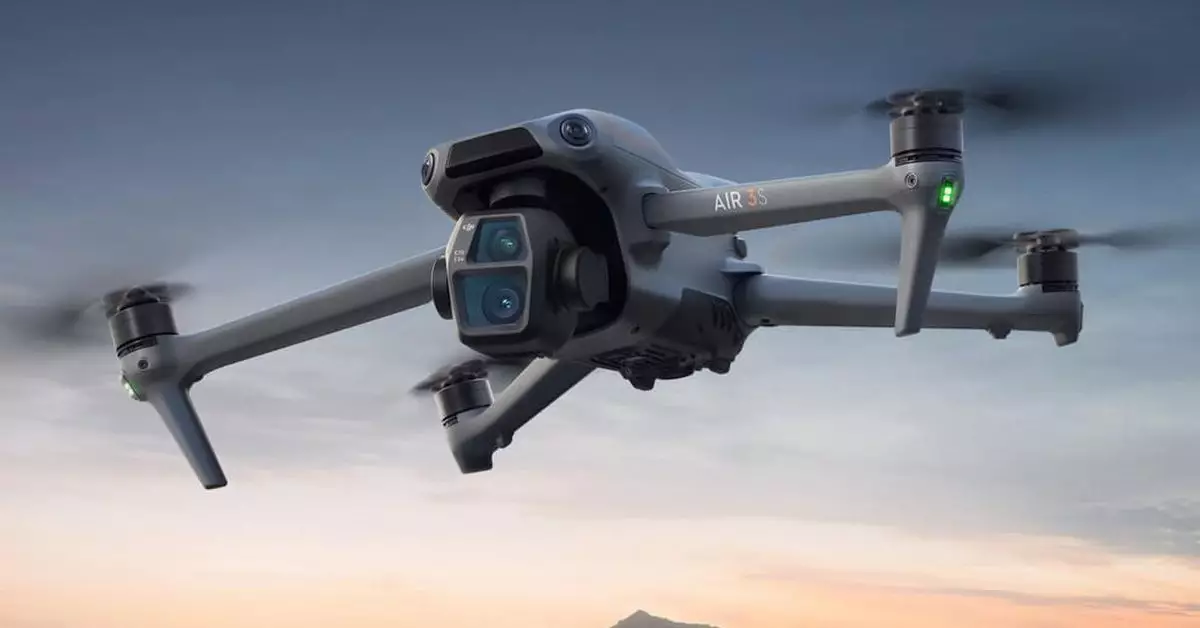The aerial panorama has experienced a seismic shift with the advent of consumer drones, particularly those produced by industry leader DJI. As a senior editor who has navigated the labyrinth of tech journalism, it is evident that the intersection between technology, governance, and international relations has never been more perilous for companies like DJI. The recent announcement of their flagship Air 3S drone being sidelined from retail availability in the United States dovetails with broader geopolitical tensions and domestic policy changes that have significant ramifications for the drone market.
DJI has publicly stated that the inability to freely import its drones into the U.S. is not simply an arbitrary decision but rather a byproduct of heightened scrutiny from the Department of Homeland Security (DHS). This scrutiny focuses on the origins of products, particularly those manufactured in China. The implications of these actions are multifaceted and suggest a shifting landscape for global commerce, especially regarding technology companies that rely heavily on international supply chains.
The use of the Uyghur Forced Labor Prevention Act (UFLPA) as a justification for blocking imports points towards a larger narrative; one that intertwines human rights issues with technological innovation. The UFLPA aims to prevent products made from forced labor in the Xinjiang region from entering the U.S. market, a measure indicative of the growing consciousness towards ethical sourcing. DJI has countered these claims by stating it does not engage in forced labor practices and that its manufacturing primarily occurs outside Xinjiang, namely in Shenzhen and Malaysia.
In an effort to clear its name, DJI has labeled the situation a “misunderstanding,” claiming they are actively engaging with U.S. Customs and Border Protection to rectify the matter. Their public relations moves, which include sending documentation to the authorities, aim to illustrate compliance not only with U.S. law but also with international human rights standards. Transparency and trust have become paramount as the brand strives to distance itself from the implications of forced labor, especially in a market deeply sensitive to ethical concerns.
However, DJI’s plight transcends mere operational hiccups; it reflects the broader context of U.S.-China relations. The company’s standing on the Department of Commerce’s Entity List raises considerable questions about its future in the American market. While the immediate ramifications of this classification primarily affect exports from U.S. companies to DJI, it frames the broader narrative of surveillance and privacy concerns associated with Chinese technology firms.
The legislative framework surrounding drone imports remains complex and fraught with uncertainties. Recent actions taken by the U.S. House of Representatives signal an intention to reinforce restrictions on DJI. Although the Senate has temporarily removed the proposed ban from a must-pass defense bill, the political landscape can change rapidly. This inconsistency in legislative action creates an environment rife with unpredictability for consumers, businesses, and manufacturers alike.
In discussions about the evolving legislative landscape, it is crucial to emphasize the potential consequences that go beyond mere import bans. If measures are enacted that restrict DJI’s ability to operate within the U.S., existing drone owners may face limitations regarding support, maintenance, and updates for their devices. The FCC’s potential move to prohibit DJI gadgets equipped with communication radios could have a chilling effect on users who rely on such devices for both recreational and professional purposes.
As the controversy surrounding DJI unfolds, one cannot help but feel an air of uncertainty permeating the future of drone technology in the United States. With heightened import restrictions and potential legislative bans looming, the landscape remains precarious. DJI’s dual challenge involves not only confronting these regulatory hurdles but also rebuilding customer trust amidst geopolitical narratives that paint it as a security risk.
In the pursuit of innovation and the growth of aerial robotics, it is critical for all involved parties—manufacturers, lawmakers, and consumers—to engage in open dialogues that prioritize both advancement and ethical considerations. Navigating the complexities of regulations and international relations will ultimately dictate the trajectory of not only DJI but the entire drone industry in the years to come.


Leave a Reply